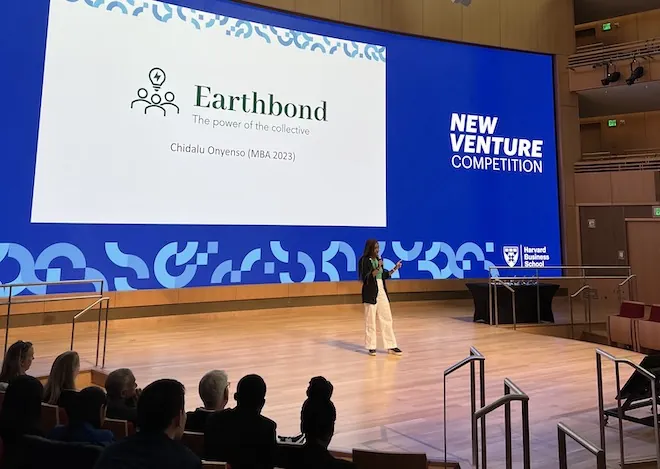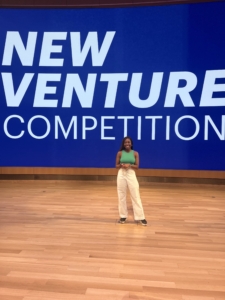
Harvard MBA Chidalu Onyenso founded Earthbound to help provide a cheaper energy alternative, reduce carbon footprint, and help run their business more reliably in Nigeria. Courtesy photos
Know of other MBAs who are doing great things? Let us know! Email P&Q Managing Editor Marc Ethier at marc@poetsandquants.com
More than 500 million Africans do not have access to reliable energy. Because of poor power supply, African businesses lose up to $100B per year. Nigeria, which is the continent’s largest economy, loses $29B of that.
“In Nigeria, only half of the population is connected — but even those people just get 6 to 8 hours of sporadic energy, meaning they have multiple blackouts per day,” says Chidalu Onyenso, who earned her MBA from Harvard Business School this spring.
To run their businesses reliably, many choose to invest in a standalone generator — an expensive solution. Those who can’t afford one often have to close their operations.
‘EVEN ON MY FIRST VISIT, IT FELT LIKE HOME’

Chidalu Onyenso: “I used my business school experience to do internships, advisory roles, and meet people in the African Business Club to build Earthbond into what it is today”
Not only are generators expensive, they’re also taxing on the environment. While Nigeria contributes less than three percent of greenhouse gas emissions globally, the African continent will be home to nine of the 10 most climate-vulnerable countries, and energy grids will become increasingly vulnerable.
Last summer, Onyenso launched Earthbond — a fintech company that helps small and medium-sized Nigerian businesses transition to solar power — to do three things for customers: provide a cheaper energy alternative, reduce their carbon footprint, and help run their business more reliably. In May, she successfully completed her studies at HBS, recruited her inaugural team member, and booked a one-way flight to Nigeria, where she will live while building her company.
Onyenso’s connection to Nigeria runs deep; her parents moved from Nigeria to the United States in the late 1980s, settling in Randolph, New Jersey. “We were one of two black Nigerian families in the entire town,” she tells Poets&Quants.
But her parents ensured that their family connected with Nigerian people — even if it meant visiting the next towns over to do so. When Onyenso reached middle school, they began taking her and her siblings to Nigeria every year, where her extended family resides. “Even on my first visit, it felt like home,” she says.
Onyenso knew that she wanted to focus her career on helping emerging markets — like Nigeria — thrive. She attended Princeton University for her undergraduate degree, majoring in political economy. After college, she spent some time in Nigeria. With a twin sister living in Abuja, Nigeria’s capital city, she was torn between moving there and working in the country’s rapidly growing tech scene or remaining in the U.S. She realized that if she was going to work in tech, she wanted to gain more skills first. “I didn’t want to be a liberal arts major trying to make it in a tech world,” she says.
HBS BY DAY, EARTHBOND BY NIGHT
Onyenso got a job at IBM as a product manager, where she worked on products in emerging markets. Next, she landed a role at a startup called Fundera, which focused on small business lending in U.S. markets. Armed with these two experiences, she applied to B-school. “I knew I wanted to be on the founding team of a startup, but I wanted it to focus on the African market,” she explains. “I felt like I needed a pause from the working world to just meet and talk to as many people as I could.”
Developing the idea for Earthbond, which is in its pre-seed stage, she says that she initially just looked at the funding gap for small and medium-sized business owners in Africa. But the main issue that kept coming up was energy. “It wasn’t just financing energy, it was the lack of access to energy,” she says.
Looking to provide a cheaper and more reliable energy source to Nigerians, her idea began taking shape. She took HBS classes by day and tirelessly worked on Earthbond by night. “I used my business school experience to do internships, advisory roles, and meet people in the African Business Club to build Earthbond into what it is today,” she says.
During her MBA, Onyenso says she worked with HBS students who are now advisors on the company. Since launching in summer 2022, Earthbond has signed eight solar provider partners. Plus, Onyenso has just signed a financing provider that will offer credit products.
‘MORE & MORE AFRICAN MARKETS ARE MORE HARSHLY AFFECTED BY CLIMATE CHANGE’

Chidalu Onyenso: “Believe in the business case, because there is one”
The way Earthbond works is simple: it’s an online platform that acquires small and medium-sized business owners that are looking for cheaper energy solutions — or solar power.
Earthbound uses Nigerian companies’ energy and financial data to offer high-quality, reliable power that saves them money each month. The customers are specific to Nigeria — not only is this because Onyenso has a special connection to this country, but it’s also the biggest economy across the continent.
Once understanding what the customers’ energy needs are, Earthbond couples that information with the customers’ revenue and cash flow. Then, the company builds out a solar solution and estimates what it would cost to solve the client’s energy demand. The cost is split to create a payment plan over a period of time that aligns with the client’s budget. “We take all of that information, bundle it up, and work with a credit provider to actually turn it into a loan for that customer,” she says.
Since Earthbond focuses on moving SMEs in Nigeria away from using a diesel or petrol-based generator towards solar, the company can generate qualified carbon credits that then further subsidize the model. “My goal is to have Africans benefit from this booming carbon credit market,” she says.
‘DON’T SECOND-GUESS YOUR ABILITY TO DRIVE SOMETHING FORWARD’
Her company became a finalist in HBS’ New Venture Competition, and a semi-finalist in the President’s Innovation Challenge. She is also part of Greentown Labs, which is one of the biggest North American climate accelerators.
Plus, she joined the Harvard Innovation Lab during her time at HBS, received a grant to work on her business last summer instead of doing an internship, and even took a class at MIT that focused on applying AI to clean energy technologies to get the most out of whatever system is being implemented. She says that HBS classes like Launching Tech Ventures and Social Entrepreneurship and Systems Change were pivotal to developing Earthbond’s model.
For other entrepreneurs who are wanting to start a venture in the climate change space, she has some advice. “Don’t second-guess your ability to drive something forward,” she says. “Believe in the business case, because there is one.”
She says there are many MBAs interested in the climate space, and thus many people to join forces with. She adds, “Do it,” she says, “because it needs to be done and someone is going to do it — and it may as well be done by you.”
DON’T MISS MEET THE ENLISTED VETERANS WHO GOT INTO STANFORD & WHARTON



